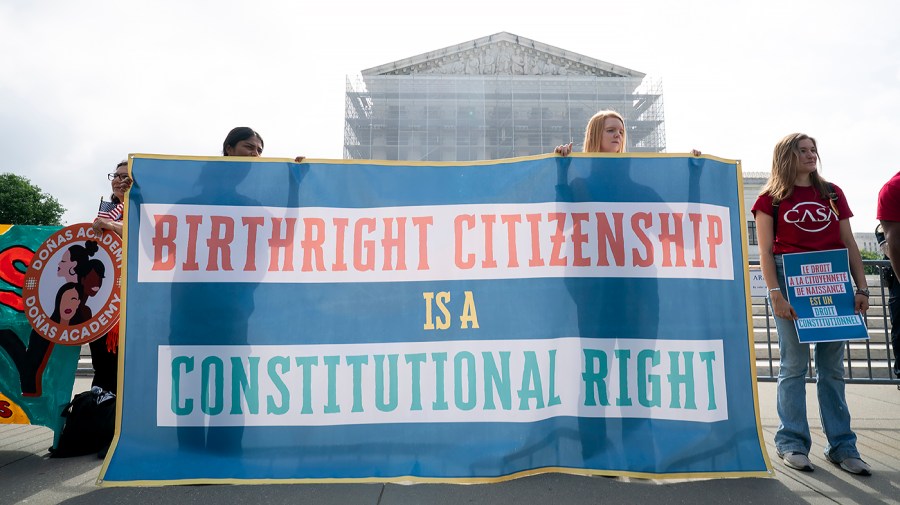
The birthright citizenship case argued before the Supreme Court last week was not about birthright citizenship at all, even if the issue was the elephant in the room.
The right to birthright citizenship is a no-brainer. It finds its basis in the text of the 14th Amendment, a statute of Congress, four Supreme Court cases and more than a century of executive interpretation.
The government, in its oral argument, all but conceded that the named plaintiffs had the right to interim relief — staying President Trump’s blatantly unconstitutional executive order pending trial on the merits. However, it argued that the nationwide preliminary injunction ordered by three district judges, left undisturbed on appeal to their respective circuit courts, should benefit only the named plaintiffs, not plaintiffs similarly situated throughout the country.
The conservative justices appeared to ignore the venerable legal maxim, arguably guaranteed by the First Amendment, that “where there is a right, there is a remedy.” At oral argument, Justice Clarence Thomas attempted to argue that nationwide injunctions have a shallow history. He might have thought it was a recent innovation, the creation of some “woke” judge in Massachusetts, not embedded in our legal history and tradition. He said the nation had “survived until the 1960s” without the use of nationwide injunctions. While some legal scholars have challenged that assertion, pointing to examples as far back as 1913, Thomas appeared skeptical about the widespread use of the injunctions at that time.
Legal devices to make judgments that bind absentee plaintiffs are not new to Anglo-Saxon jurisprudence. The power to bind absentees finds its origins in the English “bill of peace” dating back to the 17th and 18th centuries. This procedural device allowed for a single court case to settle disputes affecting numerous people, even if they didn’t directly participate in the lawsuit. The bill of peace is said to be the ancestor of today’s class action in the U.S.
The issue of “universal” (nationwide) injunctions has been with us since before the first Trump administration and has been used against both parties. One district court judge has been able to block a massive government program across the country — such as President Barack Obama’s Deferred Action for Childhood Arrivals immigration rule (blocked by a Texas trial judge), Trump’s first-term “travel ban” (blocked by a Washington trial judge), President Joe Biden’s student loan debt relief program (blocked by a Texas trial judge) or Trump’s second-term orders to school districts to stop diversity, equity and inclusion policies (blocked nationwide by four different trial judges).
Trump’s position boils down to simply this: The courts are not a co-equal branch of government. They have no authority to nullify a president’s policies with a nationwide injunction. The courts have no explicit constitutional power to invalidate an act of Congress either.
But Chief Justice John Marshall seized that power when he wrote in Marbury v. Madison (1803) that it is “emphatically the duty of the Judicial Department to say what the law is.” And judges have been doing it ever since.
It is true that some district courts may have at times gone off the reservation with nationwide injunctions that look like executive orders. There could be good reasons to question their discretion. One might think that the Trump administration could have waited for a case that tees up the issue in a principled way — where there are differing interpretations of ambiguous federal statutes, constitutional issues that haven’t been resolved in previous cases or splits in the federal circuits — instances when it might be reasonable to limit a lower court’s order just to the parties. There are good reasons to question whether trial courts should have such sweeping powers, and if so, whether only in a limited set of cases.
But the Trump administration weirdly chose to resolve this issue as part of the birthright citizenship “debate,” where his executive order is so blatantly in contravention of the Constitution, settled law and over a century of executive interpretation. Trump would impose an invented rule that would cause chaos. If successful, he may deny thousands (including many infants) of a workable procedure to obtain urgently needed medical care under Medicaid and otherwise vindicate their constitutional rights.
Is a class action a reasonable alternative to bind absentees to a judgment? Justice Brett Kavanaugh was intrigued with this idea. Apparently in his world, it is acceptable to bog plaintiffs down in such procedural niceties. Trump’s solicitor general suggested that the requirements for nationwide class certification are “rigorous,” including sufficient numerosity of class members, typicality of claims, common questions of law and fact, and conflicts of interest between the named plaintiffs and class members.
This is a dead giveaway that the government would oppose class certification when it comes to birthright citizenship. The government would certainly seek class discovery, which might unfairly reveal the identities of those it would strip of citizenship. The inescapable truth is that class actions take time, and time is something that many of those adversely affected by the executive order don’t have.
If ever there was a case for nationwide injunctions, this is it. Trump’s executive order is unconstitutional on its face. The plaintiffs have made out all the criteria set by the Supreme Court for a preliminary injunction in an opinion by Chief Justice Roberts in 2008.
There is an overwhelming likelihood of success on the merits. There would be irreparable harm to the plaintiffs absent an injunction — infants could be deported or denied social services like Medicaid available only to citizens. The balance of equities tips in plaintiffs’ favor since there is no harm to the government if a preliminary injunction issues, which merely preserves for the time being a status quo that has existed since 1868.
The injunction is in the public interest — not much of an issue here. A Pew Research poll reports that overall, 56 percent of Americans disapprove of Trump’s executive order.
The plaintiffs presented an extraordinary case that merits an extraordinary remedy. Trump should lose the case.
James D. Zirin, author and legal analyst, is a former federal prosecutor in New York’s Southern District. He is also the host of the public television talk show and podcast Conversations with Jim Zirin.


